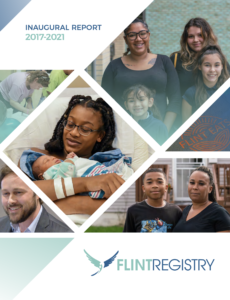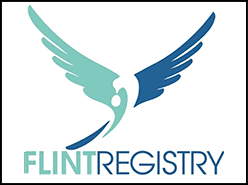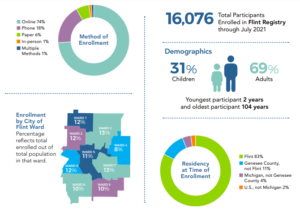By Tom Travis
As of July 31, 2021, just over 16,000 people have enrolled in the Flint Registry. Nearly 70 percent of those are adults, according numbers just released in a report documenting The Registry’s first four years of service. The oldest participant is 104 years old and the youngest is two years old.
The inaugural report details how participants are doing in areas of health, nutrition, development, and lead elimination as the Registry enters its fifth year. Among those findings:
Both adults and children report they have difficulty affording healthy food, and 43 per cent of adults say they are worried about food running out before they could buy more.
The most common reported diagnosis for adults during or after the Flint water crisis was high blood pressure (47 per cent of adults).
Nonetheless, 90 per cent of parents/caregivers describe their child’s physical health as excellent, very good, or good and 84 per cent describe their child’s mental health as excellent, very good, or good.

Cover page of the Flint Registry report. (Photo source: www.FlintRegistry.org)
The Flint Registry made over 91,000 phone calls, 272,000 mailings, and hosted 441 community events in its first four years of programming, according to a press release. As of Jan. 1, 2022, enrollment has increased to over 18,000 participants and referrals exceed 25,000.
The full Flint Registry report can be accessed at this link.The full report can also be found at their website : www.FlintRegistry.org.
Selected report findings include:
- 90 per cent of parents/caregivers describe their child’s physical health as excellent, very good, or good and 84 per cent describe their child’s mental health as excellent, very good, or good.
- 25 per cent of parents are concerned about their child’s development.
- 63 per cent of adults describe their physical health as excellent, very good, or good. 66 per cent of adults describe their mental health excellent, very good, or good for mental health.

Statistics detailed in the Flint Registry report. (Photo source: www.FlintRegistry.org)
- The most common reported diagnosis for adults during or after the Flint water crisis was high blood pressure (47 per cent of adults).
- Both adults and children have difficulty affording healthy food to eat (43 per cent of adults were worried about food running out before they could buy more).
“We are inspired by the resiliency of Flint, and we are driven to be an asset to our community. Many on our team call Flint and Genesee County home, and we are so grateful to build something amazing in Flint, by Flint, and for Flint to better support our community,” the Director of the Flint Registry, Dr. Nicole Jones said.

Director of the Flint Registry Nicole Jones, PhD, MS. (Photo source: www.publichealth.msu.edu)
22,317 referrals in four years
The Flint Registry was designed to improve the health and development of participants by connecting Flint residents to supporting services. The Flint Registry’s first referral was sent in January 2019.
By the end of the four-year grant period (July 2021), the number of referrals quickly climbed to 22,317. The most common referrals for adults were FAST Start (the City of Flint’s lead service line replacement program) and for children, the Neurodevelopmental Center of Excellence (NCE).
In December 2016, President Obama signed the sweeping Water Infrastructure and Improvements for the Nation Act (WIIN) into law. This provided funding for numerous water infrastructure projects across the country including $170 million specifically for Flint to deal with the water crisis emergency that lurked its head in April 2014.
The Flint Registry is for anyone who was exposed to Flint water because they lived, worked, attended school, or regularly visited the City of Flint during April 2014-October 2015, including children who were born before August 1, 2016, that may have been exposed prenatally.
The Flint Registry is supported by a grant from the Centers for Disease Control and Prevention’s (CDC) National Center for Environmental Health to Michigan State University College of Human Medicine’s Division of Public Health.
To “find help for my son” – Flint Registry participant
“We signed up for the Flint Registry to access resources and find some help. My son was diagnosed autistic and referred to Neurodevelopmental Center of Excellence — that’s really helped us getting him services in school and autism behavioral therapy,” Maxine Onstott, a Flint Registry participant, stated.
Community-engaged
According to the report, components of the Flint Registry’s community-engaged effort included, but were not limited to, establishing a community advisory board, conducting focus groups, creating a parent partners group, integrating a youth advisory council (Flint Youth Justice League), hiring and training community members physically located in Flint, hosting community events, developing a community ambassador program, collecting pre-enrollment feedback, obtaining Community Ethics Review Board (CERB) approval, recruiting and hiring a Director of Community Implementation and Engagement, conducting robust grassroots community outreach, and more.
The Flint Registry Community Advisory Board promotes communication between residents, parents, public agencies, and schools to facilitate input, increase community awareness, and coordinate activities to benefit those served by the Flint Registry.
The advisory board is co-chaired by Dr. Lawrence Reynolds and Kenyetta Dotson.
The board members represent fifteen sectors of the Flint Community: faith, workforce development, seniors, education, academia, organized labor, nonprofit, government, philanthropy, media, health care, behavioral health, parents, youth, and law enforcement.
Flint Registry logo represents moving forward, remembering the past and prioritizing the young
The Flint Registry logo, the Sankofa bird, is a mythical African bird from the Akan tribe in Ghana. The bird is flying forward, yet looking back, and carrying an egg in its mouth. It is symbolic of always needing to move forward, but never forgetting what happened in the past, and prioritizing the young.

To sign up or find more information, visit www.FlintRegistry.org or call 1-833-GO-FLINT. Eligible participants receive a $50 thank you check after enrollment.
EVM Managing Editor Tom Travis can be reached at tomntravis@gmail.com



You must be logged in to post a comment.